Hey, pool owners. In this video, we’re going to show you how to drain and clean your swimming pool. In a previous video, we showed you how to clean a green pool by bringing the chlorine up to shock level and continuously cleaning the filter until all the algae was removed.
In this video, we will drain all the water from the pool, do a chlorine wash on the walls, refill and balance the water chemistry. Let’s go ahead and get started.
A couple of things to consider before draining your pool: how high is your water table and where to drain those thousands of gallons. First, do not drain your pool after a significant rainfall as the water table may be too high. What that means is, if you have a shell of a pool sitting empty and the water table is high underneath it, it could potentially pop the shell out of the ground. We’ve seen that happen in Florida from time to time.
When draining your pool, you want to make sure you are diverting the water as far away from the pool basin as you can. Do not drain the water directly next to your pool because that 20,000 gallons of drained water may seep underneath the pool causing erosion or soil shifting problems

Draining the Pool
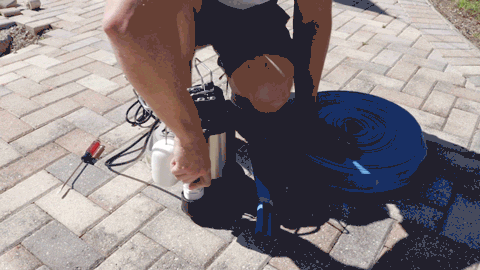
To drain the pool we prefer to use a sump pump; not only are they simple to use but you do not have to babysit the pump as it drains the pool as you would if you used your standard pool pump. To set up your sump pump, you’ll need a 100 foot (or longer) backwash hose, hose adapter, and hose clamp. We’re going to start by dropping the sump pump into the shallow end. The cord isn’t that long and you don’t want the end of it to be in the water. As the pool level drops, we’ll adjust the placement of the sump pump.
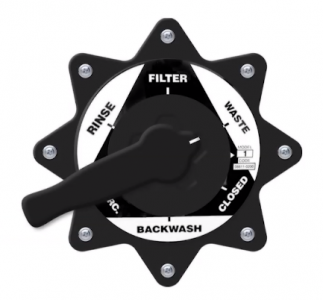
If you don’t have a sump pump but you have a sand or DE filter, set the multiport valve to waste or drain setting. Before starting your drain, make sure to adjust your diverter valves so your pump is only pulling from the main drain and not your skimmer. if the skimmer is left open, your pump will begin to pull air as the water dips below the skimmer opening.
While the pool drains
As you can see, most of the pool water has drained out just down to a couple of inches. We’re going to remove the drain cover and remove the plug that’s underneath the drain cover. We do this to prevent the shell from popping out if there was any water pressure underneath the basin, that water would bubble up through the main drain. We’re using a clean-out plug wrench right now. It has a connection for inch and a half or two-inch plugs. I’m just going to remove that plug from the bottom drain.
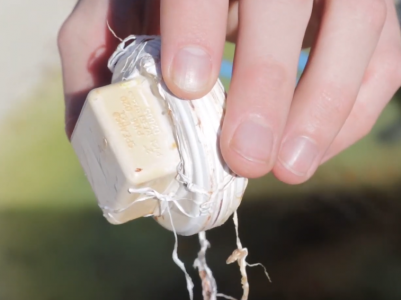
This was the plug that was underneath the main drain cover. We removed that so if there’s any pressure underneath, any water, if I have a high water table, the water’s going to come up through that main drain.

We’re going to start with just regular garden hose, just spraying some of the larger debris down to the bottom of the pool so we can pump it out.



You can use a regular nylon deck brush to get the more stubborn spots. Again, it’s going to be easier if the surface is a little wet.

Everything that we’ve pressure washed and brushed is piled up near the main drain. We’re going to use the sump pump and suck it up out of here.
We’re down the last bit of water, and what we have to do is keep diluting it and pumping it out because just the water level’s not high enough for the sump up to grab it, so we’re just pumping it out and diluting it with the freshwater until we get all the green algae out.
Once you’ve pressure washed the pool surface and removed the algae-filled water, it’s time to do a chlorine wash on the pool walls. Before getting started, you’ll want to reinstall the main drain cover.

Next, prepare the walls by wetting them down with a garden hose.
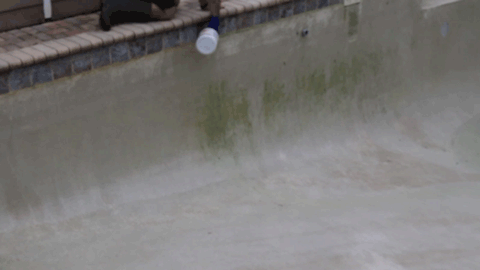
When applying chlorine to the walls, you want to do it from outside of the pool, pouring it down the walls as evenly as possible to avoid streaking. The reason for pouring from outside of the pool is to avoid tracking chlorine onto the deck and creating unwanted stains. Most algae should be killed off in a matter of minutes after pouring chlorine on the walls. Continue to pour around the entire perimeter of the pool.


Let the chlorine sit for about 30 minutes before washing all the pool surfaces off with fresh water. You can now proceed to fill the pool back up with water.
Starting up your Pump and Filter System

It’s a good idea to start with a fresh filter. This particular equipment pad has a cartridge filter. We are going replace the cartridge. If you have a sand or DE filter, you might want to change the sand or replace the DE grids because chances are the inside of these filters, if you had a swamp. It just makes sense to, if you go through this entire process to have fresh water, and clean walls, you should also start with a fresh filter.



We’re going to turn the pump on, and we got the air bleed open, and we’re going to leave it open until water starts to spray out.
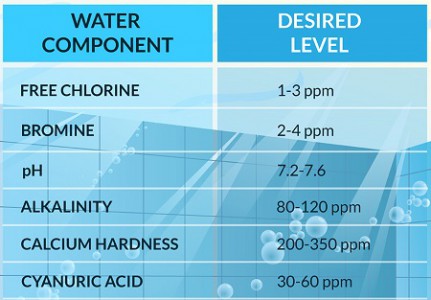
Now that the pool system is up and running it is a great time to test and adjust the chemicals to avoid your pool from turning green again. The six main readings you’ll want to check for are free chlorine, total chlorine, pH, cyanuric acid, alkalinity, and calcium hardness.
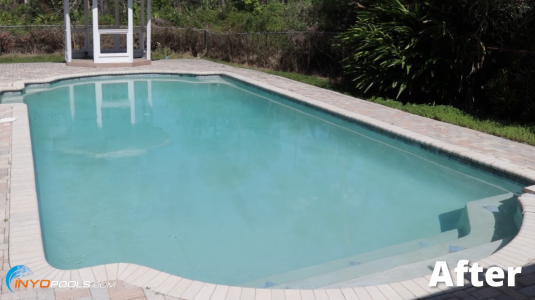
As you can see, we’re done with the drain and clean. The owner says it hasn’t looked this good in 10 years, so we’re pretty happy with the job. The whole process took us four days. The first day, we drained it, we pressure washed it. The second day, we came back and we did the chlorine wash on the sides and the bottom. Then the last two days, it was just filling up. It’s all ready to go and looks good to swim in.
If you have any questions about this particular job or anything else pool-related, leave a comment down below or visit us at INYO Pools. Thanks for watching.
If the drain and clean method is not a desirable route, I suggest taking a looking at our How to Clean a Green Pool Article & Video; in this guide, we use the SLAM (Shock, Level, and Maintain) to clean a green a pool. General consensus is that if you cant see the bottom of the deep end of the pool then it is best to Drain and Clean your Pool as this will be quicker and less expensive then treating the pool with chemicals. If you can still see the bottom of the deep end then proceed with this guide on How to Clean a Green Pool with Chemicals.





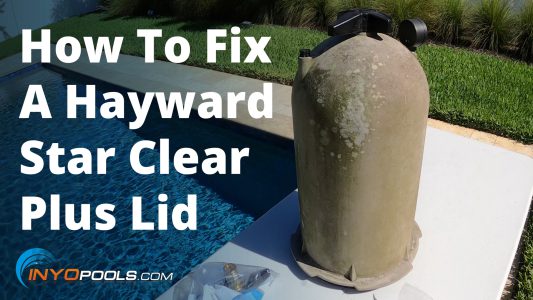
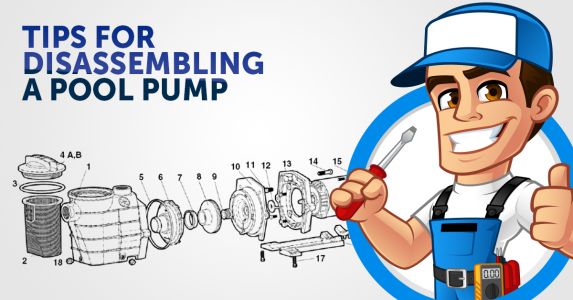






What if you cant use a pressure washer cause your plaster is coming off the inside just do a chlorine wash ? Whats the best way to keep it clear in the Florida sun it seems to get cloudy alot ?
The best way to keep your water clear is properly balanced water chemistry. Unfortunately, there isn’t much of a secret there. If you are new to pools, I would test your water a few times a week to see how your pool is maintaining its chemistry.
You can try brushing the pool water instead of the pressure washer.
If my stains are more stubborn, what other chemicals can I use? My pool is an inground pool with plaster finish. Thank you.
DAVID
Muriatic acid is stronger than the chlorine wash and should clear up most organic material stains.
Aloha Matthew Gee wish I had read and seen this video before I drained my pool I could have done so much more by taking off the drain plugs and cleaning out that pipe so much that I could have learned but being a newbie this is how you learn. So glad you are here for us Aloha Antoinette Jackson
Sorry about my lack of proper punctuation. I am handicapped, and it is down to one finger typing, or dictating on my cell phone- plus inability to see well.